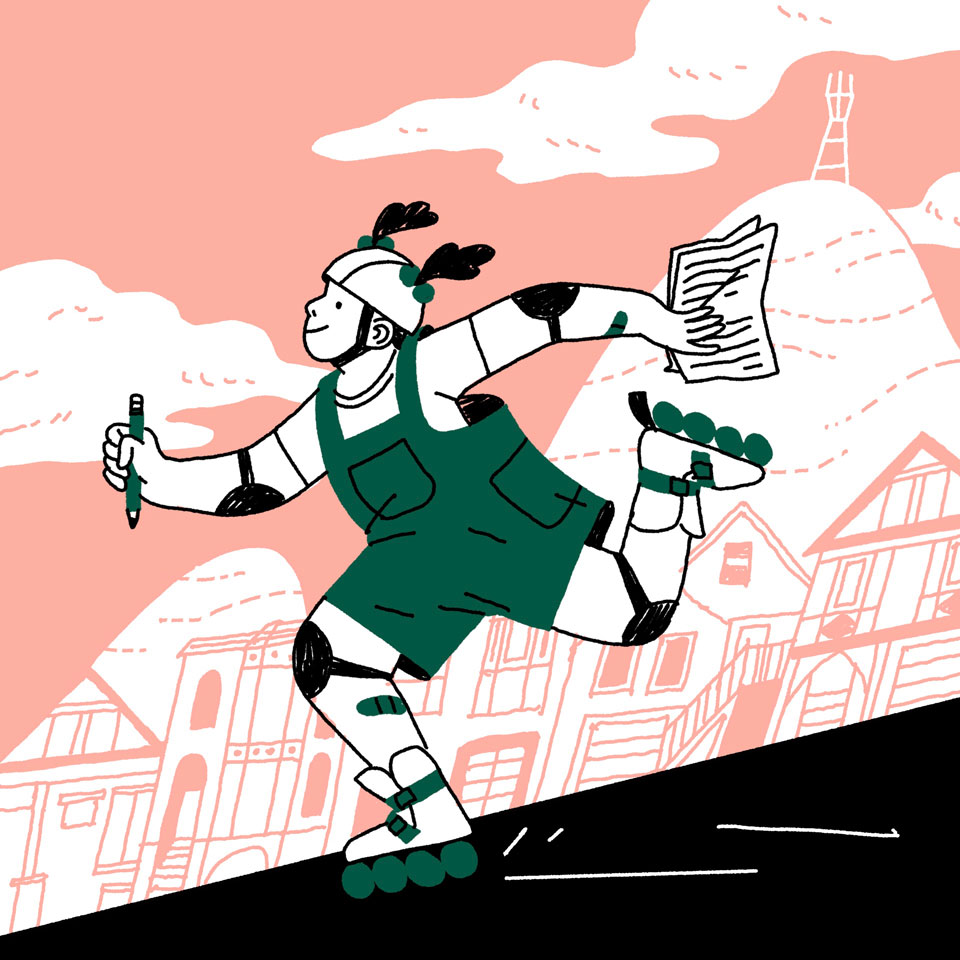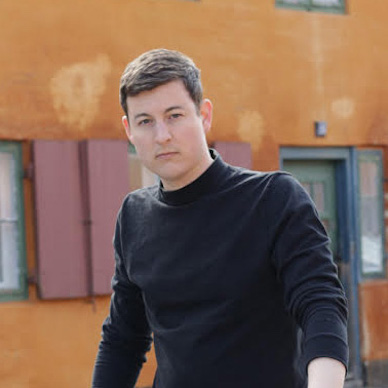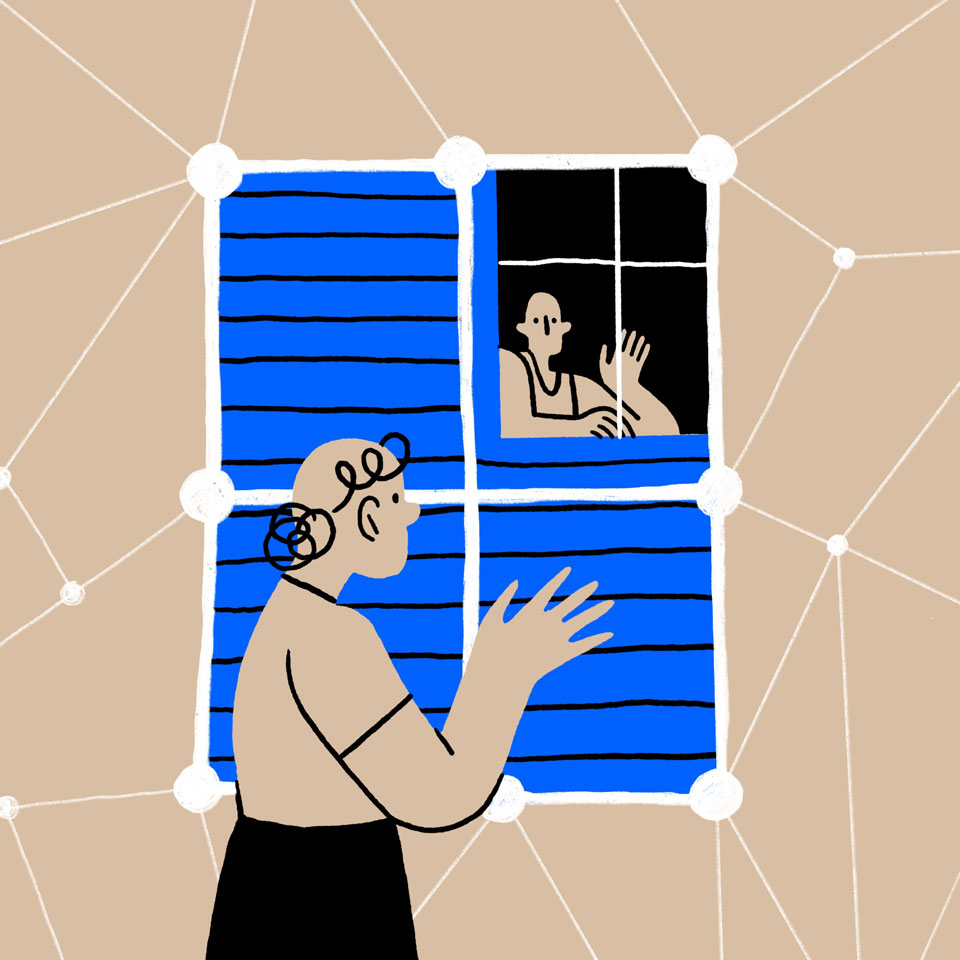
What you can learn from a team of hard-working six year olds
Published on June 26, 2020
Shortly after lockdowns became the norm and a lot of parents became at-home employees and tutors, San Francisco journalist Chris Colin got an idea, a creative way to redirect the piqued energy of his community’s schooling-at-home population: What if I started a local newspaper written entirely by kids in the neighborhood? A few months later, Six Feet of Separation isn’t just a hit in his ZIP code of Bernal Heights. It boasts a foreign correspondents section with submissions all the way from Spain and India. In it, kids write about everything from their feelings on the global pandemic and Black Lives Matter protests to good pranks you can play on your siblings.
“All these kids are just shut up inside not seeing anyone and, as a parent, it feels like you've trapped a little bear cub in your living room,” he said. “But when there's a project that's creative, that engages kids, makes them feel connected to other kids who are out there in the world experiencing some version of this like them, it just feels good for their mental health.”
Of course, collaborating with a team of hundreds of children comes with its challenges—like how to deliver professional feedback, over e-mail, to a first grader—but it certainly has some upshots, too. Here, Chris shares how he keeps morale up on the team, how he sparks creativity in young minds who are experiencing a wild world, and what he’s learned from the way kids get things done.
Where did the idea for Six Feet of Separation come from?
It was back in March, if you can remember that far back, a lifetime ago—day two of the San Francisco Unified School District being closed. We’d been hearing about 'the strange new virus' for awhile, so it’s not like it caught me off guard, but something about that day, seeing my two children around the house, I could sort of feel it in the atmosphere—that there were kids all over the neighborhood who were suddenly home with nothing to do. And their parents not knowing what to do, trying to get stuff done and keep the kids entertained. Everyone dealing with confusion and feelings around what was happening.
I had this moment of clarity that something needed to be done, because this wasn’t going to be a three-week thing. It was going to be a long slog. As a journalist, I don’t have that many moves. That day, I wrote an e-mail and sent it to a handful of friends and neighbors to start an online neighborhood pandemic newspaper, for kids by kids.
I figured children were going to be going through this strange, mysterious thing. And if they could have a little bit of agency at this time, if they could see their voices out there, that would be a good thing. Kids have so little control in life, in general. I mean, they can't even like reach the peanut butter on their own.
I take it the e-mail struck a chord.
You know, I figured I'd get like a handful of replies and, and that would be it. By the next day, I had dozens of pitches. Then I had hundred. By the end of this interview, I'll have probably another 40 in my inbox.
That’s a lot for one person to organize! Are you going to get any help?
Luckily I just received a large grant from AT&T, which will let me keep doing this and expand it considerably. Because even after the medical phase is over—knock wood—kids are going to be feeling the psychic, social, and economic ripples for a long time.
"Kids have so little control in life, in general. I mean, they can't even like reach the peanut butter on their own."
By definition, editors are critical and, generally speaking, tend to not mince words. What’s been your philosophy editing kids?
One of the things that I said in that first email is that my editorial policy would be “yes.” I felt like all these rules were being broken. The world has been turned upside down. I mean suddenly you can get like a takeout cocktail from your local bar. Why should we not change that stupid rule that says you have to like get rejected all the time by editors and feel terrible about yourself? So I said my editorial policy would be “yes.” Which means I’m publishing hundreds and hundreds and hundreds of pieces.
So how do you end up giving feedback then?
So you don't want to praise every single thing that comes down the pike. In general though, when you make someone, anyone, feel better, they feel better about themselves and do better work—more creative work. They go out on a limb.
So my sort of secret sneaky plan was to make them feel good at first, just by being like, yep, I will publish, you know, 10 reviews of The Good Place and 9,000 banana bread recipes. And, like grownups, kids get so psyched like when they get something published. They just feel good. Then when they would submit something else I might say, that's great. I can't wait to publish this. I wonder if you could explore this idea a little more. Or hey, what do you mean by that? What does that feel like? You start doing editor stuff on them. And by then they're starting to feel a little more confident. They’re like yeah, I can push that a little bit in their funny eight-year-old way.
So you e-mail the edits then?
Well, my writers range in age from four to 17. Funny mix. I'm often emailing with parents who are manning the computer. Every now and then though you'll get like a six year old with an e-mail address though. And I'm like, well, okay!
Since I’m not paying these kids, I also try to send a personal message to every single one and celebrate what they’re doing—celebrate the effort, which is sort of a parenting thing. You try not to talk about the piece being brilliant or them being brilliant. You talk about how much work they put into it or how much thought or whatever.
Are kids better or worse at deadlines?
Don't get me wrong. Some kids do get nervous about writing. But it's interesting. Like you and I as grownups are winding a decade’s worth of neuroses around whatever we’re writing. And they don't do that. They're free from that. I don't mean to be simplistic. Kids are not free spirits entirely, but that anxiety can really impact your work. So it's funny. You can just say, like, go write this thing. And then they'll be like, okay, I'll go do that. They don’t freak out about whether they have talent or who’s going to see it. Does this sound too much like so and so? Who am I? What am I? All these questions. They ask, do you know where the pencil is? Often they lose the pencil. That’s sort of their issue.
What's the strangest pitch you’ve received?
We have a Criticism section—lot of book and video game reviews. But I just had two siblings review each other as humans, which is also appropriate because a lot of siblings are trapped under the same roof in the same bedroom right now. And they're learning how to either get along or totally subvert each other's lives.
Clever way of processing the absurdity of 2020.
Kids are totally feeling this thing as much as we are, but on a totally different frequency! While you and I probably worry about the future of our society, our careers, and how this will affect the election, whether someone we love will get sick, those are all theoretical to a juvenile mind. In my experience, what they tend to focus on is very concrete stuff—things that are right in front of them. How much Minecraft do I get to do today? Wait, we're having dinner at six o'clock now? I don't understand. The minutia.
Or take conversations. I mean, how many times can adults talk about the politics of mask wearing or whether or not it's safe to do X, Y, or Z? But kids, when they talk about it, it's in a whole new language. It’s refreshing to see the other takes that these little beings come up with.
What have you learned from how they work?
It's funny to be in correspondence suddenly with hundreds of children because it exposes all the bits of culture we take for granted. So like, me owing a kid an email. You’re slow, and then you want it to be twice as good because you took so long. Pretty soon you have to write War and Peace to this eight-year-old child who submitted an article.
And then you get a reply—the parents are in front of the screen, and the kid is like, tell him that, you know, this and this! And it's funny. Kids very rarely say, Dear Chris or Hi Chris! or Hope this finds you well! I'll write like a pretty beefy reply to some kid about how how special her article was. And she’s just like, OK, cute.
And doing this has been a lot of high volume work. In addition to all this, I’m a working journalist, so I’ve also learned to be more efficient about writing a real quick e-mail and not sweating it. Less chitchat and pleasantries.
As their sort-of boss, what wisdom do you try to impart on them?
I really push the idea that your work doesn't need to be perfect. And I think that's something that it takes grown ups way too long to grasp. But perfectionism is obviously the enemy of creativity. And so I try and teach kids what they're starting to say in schools, which is practice makes progress.
And I hear myself say that to the kids and a part of me tries to listen, too. There's nothing like a pandemic to point out that when you're worried about whether you read that sentence and it sounds perfect or ridiculous—it doesn't matter. It's fine. Just get it done. I really like the idea of just getting it done these days.



